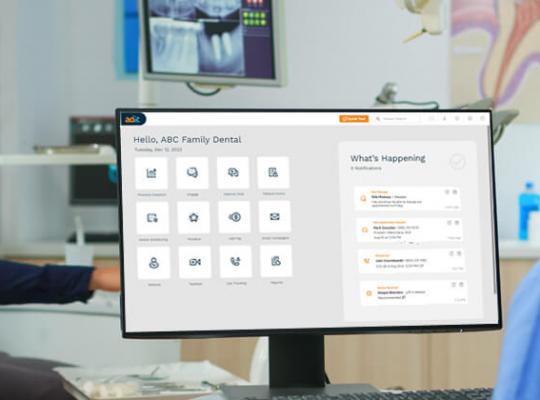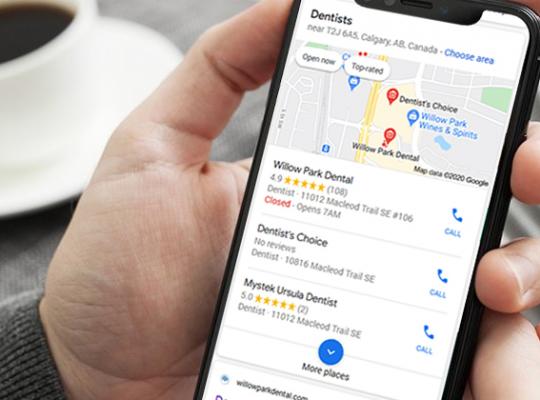Navigating the Minefield: Top No-No's in Dental Practice Marketing

Any form of business marketing comes with significant risk, but making mistakes in your approach, content development and even your delivery can be costly. The waste of time and money on ineffective advertising and branding campaigns often makes dentists shy away from investing in marketing, but this is often the result of committing one of the top dental practice marketing no-nos shared in this blog.
From missteps in digital advertising to neglecting the patient experience, there are several crucial mistakes that dentists should avoid to maximize their marketing ROI. So, before you throw in the towel and decide to only rely on word-of-mouth referrals and occasional mailers, consider the following dental marketing pitfalls that may be holding your office back.
The Importance of Dental Marketing: Unlocking Practice Growth Potential
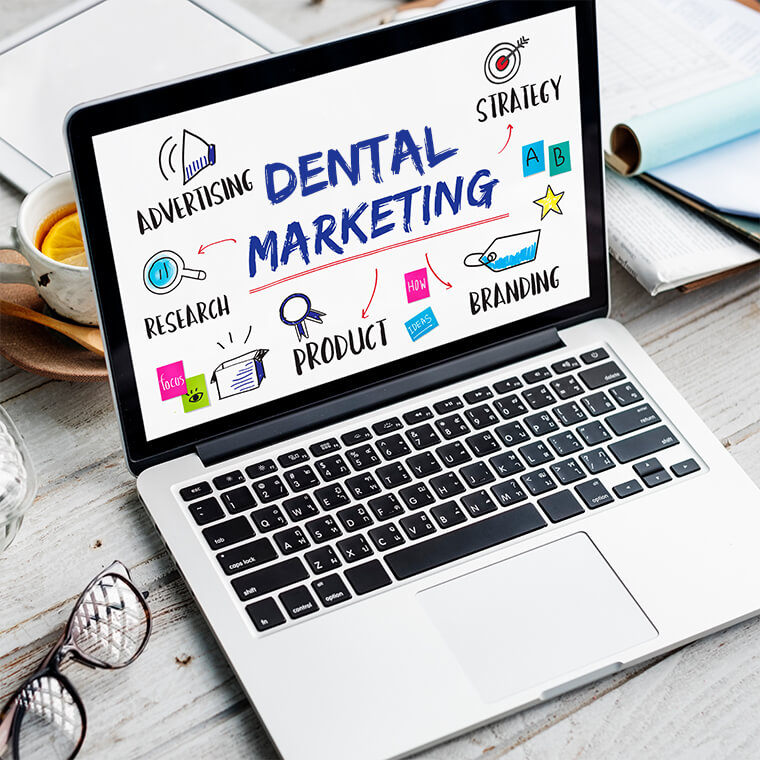
Investing in dental marketing isn't just about promoting services; it's about positioning your practice for success in an increasingly competitive landscape. Between the current staffing shortage, insurance reimbursement trends, and rising costs associated with running a practice, you may be wondering if marketing is truly worth the time and effort.
Consider these compelling statistics that underscore the importance of effective dental marketing strategies:
- Increased Patient Acquisition: 97% of consumers search online for local businesses, including dental practices.
- Enhanced Patient Engagement: 41% of consumers switched healthcare providers due to poor engagement.
- Improved Practice Reputation: 84% trust reviews as much as personal recommendations.
- Maximized Return on Investment (ROI): Email marketing alone generates an average ROI of $42 for every dollar spent.
- Marketing Perception: Despite its proven effectiveness, nearly 50% of businesses still treat marketing as a cost rather than an investment.
Clearly, dental marketing isn't just for DSOs and multi-branch practices with large budgets; it's a necessity for practice growth and success. Using innovative marketing strategies, leveraging data-driven insights, and prioritizing patient-centric approaches can position your dental office as a leader in its community and help it thrive.
The Ultimate List of Dental Marketing Don'ts
Dental marketing requires a deep understanding of what not to do can be as much as what does. From common blunders to overlooked strategies, this compilation sheds light on the missteps to avoid, empowering you and your dental team to refine your brand's approach and achieve maximum impact in reaching your target audience.
1. Failing To Address Negative Reviews
Avoiding negative reviews by ignoring them may seem appealing, but this practice can harm your dental office's online reputation and hurt patient acquisition efforts. Proactively addressing negative feedback demonstrates your commitment to patient satisfaction and presents an opportunity to enhance your practice's image. Responding with professionalism and empathy, expressing gratitude for the feedback, and offering resolutions show patients that their concerns are valued and taken seriously.
Interestingly, negative reviews, when handled effectively, can actually contribute to positive marketing outcomes. Transparently addressing negative feedback showcases your practice's authenticity and commitment to continuous improvement, which can resonate positively with prospective patients. Plus, studies have shown that consumers are more likely to visit a business if it responds to negative reviews, highlighting the potential impact of proactive reputation management.
2. Neglecting Website Optimization

Running an unoptimized dental website is like opening a storefront on a bustling street but forgetting to turn on the lights or tidy up the display. Without the proper attention to optimization, your practice website may blend into the digital background, making it challenging for potential patients to notice or navigate. This can significantly impact your practice's online visibility and user experience, making it harder to attract and retain patients in today's competitive digital landscape.
Website optimization encompasses more than just technical aspects like SEO and mobile responsiveness—it also involves creating a user-friendly experience that engages and informs visitors. Clear navigation, intuitive layout, and compelling content are all essential elements of a well-optimized dental website design. By providing visitors with easy access to information about your services, treatment options, and practice philosophy, you can build trust and credibility, ultimately increasing your conversion rates.
3. Failing to Target the Right Audience
Do you like to play darts with the lights off? Sure, you may hit something, but the chances of hitting your target are slim. Without a clear understanding of who your ideal patients are, your marketing efforts may fall on deaf ears or, worse, reach individuals who are unlikely to become valued patients. This scattergun approach not only wastes resources but also dilutes the impact of your messaging and diminishes the return on investment for your marketing campaigns.
The solution lies in precision targeting - honing in on the individuals most likely to resonate with your practice's offerings and become loyal patients. By defining your target audience based on demographics such as age, gender, location, and socioeconomic status, as well as psychographic factors like interests, values, and lifestyle choices, you can create detailed personas that represent your ideal patients.
Switching from Mango and Sesame to Adit saved Peace Garden Dental 22 hours/ week What could your dental team do with an extra 20+ hours a week? After juggling multiple platforms, Peace Garden Dental switched from Sesame and Mango to Adit. In...
Download Case Study4. Overlooking Local SEO
Ignoring local SEO is a significant oversight for dental practices, diminishing visibility in local search results and hindering connections with nearby patients actively seeking dental services. Key elements of effective local SEO include maintaining consistent NAP (Name, Address, Phone number) information, implementing geo-targeting strategies, and leveraging Google Maps ads to increase local visibility.
Geo-targeting strategies enable your dental office to reach specific geographic areas with online advertisements. For instance, an orthodontist in San Francisco can target its online ads to users within a 10-mile radius, ensuring that the message reaches potential patients in the local area. Plus, you can use Google Maps ads to place practice information directly in front of users conducting local searches, maximizing your visibility and attracting more patients.
5. Relying Solely on Traditional Marketing
While traditional marketing methods like print ads and direct mail have historically been effective for dental practices, the landscape of marketing has evolved significantly over the past two decades. Relying solely on these strategies can restrict your practice's ability to connect with today's tech-savvy consumers. Remember, most people spend a significant amount of time online, so it's crucial to adapt and embrace digital marketing channels to remain competitive.
Incorporating digital marketing strategies such as social media, email marketing, and pay-per-click advertising into your marketing mix, you can significantly expand your practice's online presence and tap into a broader audience base. Social media platforms like Facebook, Instagram, and Twitter offer countless opportunities to engage with patients, share valuable content, and build meaningful relationships.
You should also not forget email marketing campaigns that allow you to stay top-of-mind with patients, provide updates on services and promotions, and nurture leads over time. Also, pay-per-click advertising (PPC) enables you to target specific demographics, interests, and geographic locations, ensuring your message reaches the right audience at the right time.
6. Neglecting Patient Experience

From the very first interaction, whether it's clicking on an ad or making an initial inquiry, every touchpoint shapes the patient's perception of the practice. This is why it's imperative to prioritize creating a stellar patient experience right from the start.
You can start your dentist-patient relationship off on the right foot by ensuring that ad landing pages are user-friendly, informative, and relevant to the patient's needs. Then, work with your dental team to focus on delivering exceptional service from the moment a potential patient clicks on an ad. Once a patient makes an inquiry or schedules an appointment, staff should be trained to provide attentive and personalized service, addressing any questions or concerns promptly and empathetically.
And don't forget to ask for feedback from patients to continuously improve their experience and reinforce their commitment to patient satisfaction. Your goal is to create loyalty and positive word-of-mouth through patient engagement that generates sustainable growth for your clinic.
7. Underestimating the Power of Content Marketing
It's the new normal to rely on the Internet 99% of the time for information which is why compelling content serves as a crucial tool for building trust and fostering meaningful relationships. You can alleviate anxiety, educate, and establish your dental authority through informative and relevant content.
Whether you share this information through your practice website, a blog, social media platforms, or email newsletters, content marketing will maximize its reach and impact. Every channel your dental brand uses is an opportunity to engage with patients at different stages of their healthcare journey, reinforcing your commitment to patient education and satisfaction. Using a content strategy that resonates with patients enhances patient relationships, strengthens brand loyalty, and ultimately drives practice growth.
8. Violating Patient Privacy
In dental practice marketing, adhering to HIPAA regulations is non-negotiable, especially concerning patient privacy. Whether it's sharing testimonials on social media, including patient experiences in email newsletters, or featuring success stories on the practice website, dentists must prioritize obtaining explicit consent from patients before disseminating any information publicly. This not only safeguards patient privacy but also ensures compliance with legal requirements, fostering trust and loyalty among patients.
To meet HIPAA marketing standards, dental practices should establish clear protocols for obtaining consent and managing patient information in marketing materials. Regular staff training sessions can reinforce the importance of patient confidentiality and educate employees on proper procedures for handling patient data. By prioritizing patient consent and compliance, your dental office can maintain patient privacy while effectively leveraging marketing channels to engage with its audience.
9. Not Offering Online Scheduling
Converting potential patients into booked appointments often boils down to convenience. If your dental website doesn't offer online scheduling capabilities, the chances of visitors scheduling a visit immediately decrease. Online scheduling software like Adit can integrate with your existing PMS and internal calendar seamlessly, ensuring that interested leads can self-book with ease and without delay. This convenience also enhances the patient experience while boosting conversion rates by capitalizing on the initial interest generated by your marketing efforts.
Investing in appointment software also demonstrates your practice's commitment to patient-centric care, enhancing brand perception and setting you apart from competitors.
10. Failing to Engage with Patients on Social Media

Social media platforms offer a powerful opportunity for dental practices to engage with their patients, build relationships, and showcase expertise. Even if you personally don't like social media, not using it to raise brand awareness is one of the most cost-effective marketing opportunities you'll miss.
To engage on social media successfully requires a few basic guidelines:
- Be active on platforms like Facebook, Instagram, and Twitter
- Share engaging content regularly
- Respond promptly to comments and messages
- Use visuals to enhance posts
- Incorporate storytelling
- Utilize social media ads
- Encourage user-generated content
- Host interactive events
- Monitor analytics
- Stay updated with industry trends
We live in a digital communication age where social media engagement has become a cornerstone of effective marketing regardless of your industry. Using this technology will help your practice enhance patient engagement, drive practice growth, and ultimately, improve patient outcomes through relationship building.
11. Neglecting Mobile Optimization
This is one of the most common mistakes dentists make. Ignoring mobile optimization for your marketing content, including ads, can act as a drag on your dental practice's ability to effectively reach and engage with your target audience. Most online users access content from their laptops, tablets, phones, and other favorite mobile devices, so when you overlook optimization, mobile viewing can result in distorted, slow-loading content that frustrates users and drives them away. To address this, use mobile-friendly design elements, responsive layouts, and optimized multimedia content to enhance the user experience across all devices.
Also, before implementation, thoroughly test how an ad, landing page, or dental website looks across various devices and screen sizes to identify any issues and make necessary adjustments.
12. Failing to Regularly Assess and Diversify Content
While creating content is essential, the journey doesn't end once it's published. You must establish a comprehensive content strategy that goes beyond just creation and includes ongoing evaluation and optimization. Regular assessments of content performance are vital to understanding what resonates with your audience and what doesn't. By monitoring key metrics such as website traffic, social media engagement, and email open rates, dental practices can gain valuable insights into which pieces of content are driving meaningful interactions and which may be falling flat.
Plus, diversifying content is essential to keep audiences engaged and interested over time. Continuously exploring new topics, formats, and channels allows dental practices to cater to the diverse preferences and interests of their audience. Whether it's experimenting with video content on social media, launching a podcast series, or collaborating with influencers in the dental industry, diversification opens up new opportunities to connect with patients and differentiate your practice from competitors.
13. Inconsistent Messaging
Inconsistency in messaging can confuse patients and undermine your practice's brand identity. When your messaging lacks coherence across different channels and touchpoints, it can lead to a disconnect between what you promise and what patients experience, eroding trust and credibility.
Develop a clear and cohesive messaging strategy that aligns with your practice's values, mission, and brand personality. Ensure consistency in tone, language, and key talking points across all marketing materials, including your website, social media posts, email communications, and in-office signage. Regularly review and update messaging to reflect changes in your practice, industry trends, and patient feedback, maintaining alignment with your overarching marketing goals.
14. Using Cookie-Cutter Messaging
Cookie-cutter messaging, or generic content that lacks personalization and fails to resonate with your target audience, can be a significant deterrent in dental practice marketing. When patients encounter messaging that feels impersonal or irrelevant to their needs and preferences, they are less likely to engage with your practice and may seek services elsewhere.
Tailor your messaging to reflect the unique characteristics and needs of your target audience. This can help improve understanding of patient demographics, preferences, and pain points, and craft content that speaks directly to them. Personalize routine emails and text communications by addressing patients by name, acknowledging their specific concerns, and offering solutions that are tailored to their circumstances. Invest in marketing automation tools that allow for dynamic content creation and targeted messaging based on patient segmentation, ensuring that your communications are relevant and impactful.
15. Not Having an Active Dental Blog

Failing to incorporate blogging into your dental practice marketing strategy is a missed opportunity to engage with current and potential patients on a deeper level. Blogs provide a platform for sharing valuable information, addressing common questions and concerns, and establishing your practice as a trusted authority in the field.
If you do have a dental blog on your practice website, make you regularly publish informative and relevant content that educates and empowers your audience. Cover topics ranging from oral hygiene tips and dental procedure FAQs to industry news and practice updates. Use your blog to showcase your expertise, share patient success stories, and highlight special promotions or events.
Don't forget to encourage interaction by inviting readers to comment, ask questions, and share posts on social media. Consistent blogging not only enhances your online visibility and credibility but also helps attract organic traffic to your website, improving search engine rankings over time.
16. Prioritizing Service-Focus Over Patient-Focus
A common pitfall in dental practice marketing is placing too much emphasis on services and treatments rather than addressing patient needs and preferences. When marketing efforts focus solely on promoting procedures and offerings without considering the patient experience, it can lead to a disconnect and alienate potential patients who prioritize personalized care and attention.
Shift your marketing strategy from a service-centric approach to a patient-centric approach that prioritizes the overall experience and well-being of patients. Instead of simply highlighting treatments and procedures, emphasize the benefits and outcomes that matter most to patients, such as improved oral health, enhanced aesthetics, and increased confidence. Showcase testimonials and success stories that demonstrate your practice's commitment to patient care and satisfaction.
17. Neglecting Landing Pages for Ad Redirects
Overlooking the importance of dedicated landing pages for ad redirects is a missed opportunity to maximize the effectiveness of your digital advertising campaigns. Sending traffic from ads directly to your practice's homepage or generic web pages can lead to confusion, poor conversion rates, and missed opportunities to capture leads and drive action.
For example, create custom landing pages tailored to specific Google Ad campaigns and target audiences to provide a cohesive and streamlined user experience. Design landing pages with clear and compelling calls-to-action (CTAs) that support ad messaging with a seamless path for visitors to take the desired action, whether it's scheduling an appointment, downloading a free resource, or contacting your practice for more information.
18. Inaccurate Contact Information

Inconsistent and outdated contact information across your professional online platforms can frustrate potential patients and hinder their ability to reach your dental practice. Whether it's a wrong phone number on a business listing or an outdated address on your website, discrepancies in contact information can lead to missed opportunities for patient inquiries, appointments, and ultimately, revenue.
Regularly audit and update your practice's contact information across all online channels, including your website, Google Business Profile, social media profiles, and online directories. Ensure consistency in details such as phone numbers, addresses, email addresses, and office hours to provide a seamless experience for patients seeking information or scheduling appointments.
19. Spamming Patients with Marketing Material
Overloading patients with excessive marketing material through their phones, emails, and social media accounts can be counterproductive and damaging to your practice's reputation. Also, sending unsolicited communications without their consent can lead to frustration, annoyance, and even alienation.
Marketing demands respect for patients' privacy and preferences by obtaining explicit consent before sending marketing communications via email, SMS, or social media. Implement opt-in/opt-out mechanisms that allow patients to control the frequency and type of marketing messages they receive. Personalize your messaging based on preferences shared in their intake form or based on past interactions with your practice to increase relevance and engagement. It's also important to develop an appropriate communication cadence to ensure they receive promotional content at a pace that isn't overwhelming.
20. Marketing without Professional Advice
One of the most detrimental mistakes a dental practice can make in marketing is foregoing professional advice from experts in the field. Without the guidance of seasoned digital marketers who understand the ins and outs of branding and advertising, many dental organizations fall behind their competitors, wasting resources on ineffective strategies, and missing out on opportunities for growth and success.
The best solution is to accept the importance of experienced guidance from a reputable marketing agency or consultant who has a proven track record of achieving your specific goals. Collaborate with these experts to receive strategic insights, data-driven recommendations, and customized solutions tailored to your practice's unique needs and objectives.
Practice Management Software Curbs Dental Marketing Pitfalls
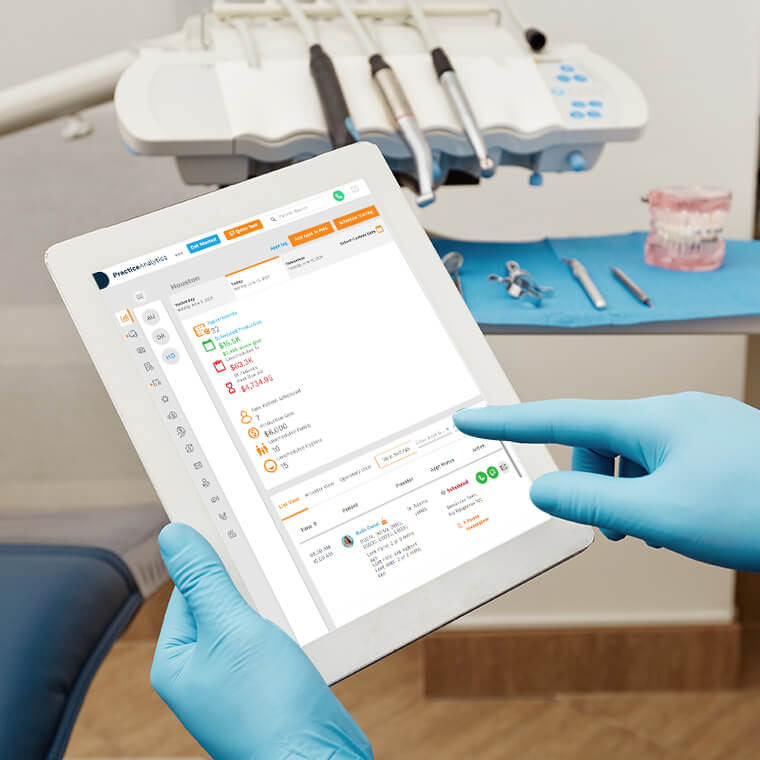
One of the top mistakes that dentists frequently make in their dental marketing efforts is not using a state-of-the-art practice management software solution like Adit. As a dental professional, you live in a busy world of patient care, staff management, and financial sustainability. Staying organized and efficient is paramount to your day-to-day operations, but traditional methods of managing these tasks are time-consuming and prone to errors, leaving little room for effective marketing initiatives.
This is where modern dental software steps in with the tools needed to streamline process, balance workloads, and boost productivity. Here's how:
1. Enhanced Patient Communication
Effective patient communication is vital in dental marketing and practice management software facilitates this through automated appointment reminders, personalized follow-up messages, and targeted marketing campaigns. This enhanced communication not only boosts patient satisfaction but also strengthens the bond between the dental practice and its clients.
For instance, with practice management software, busy individuals can receive timely appointment reminders tailored to their schedules, reducing missed appointments and frustration. Additionally, personalized follow-up messages express gratitude and provide post-treatment care instructions, enhancing patient trust and loyalty. You could also use targeted marketing campaigns to further engage patients, keeping them informed about relevant services and promotions.
2. Data-Driven Insights
Understanding patient demographics, preferences, and behavior is crucial for crafting effective marketing campaigns. Cutting-edge practice analytics collects valuable patient data and generates insightful reports using powerful AI-driven algorithms, empowering practices to make data-driven decisions.
Imagine the marketing benefit of your dental practice discovering through this capability that a significant portion of its patient base consists of millennials who value convenience and technology. Armed with this insight, you can launch a digital marketing campaign highlighting your clinic's state-of-the-art technology and convenient appointment scheduling options. Data-driven insights optimize marketing and help deliver personalized experiences that resonate with patients.
3. Streamlined Appointment Scheduling
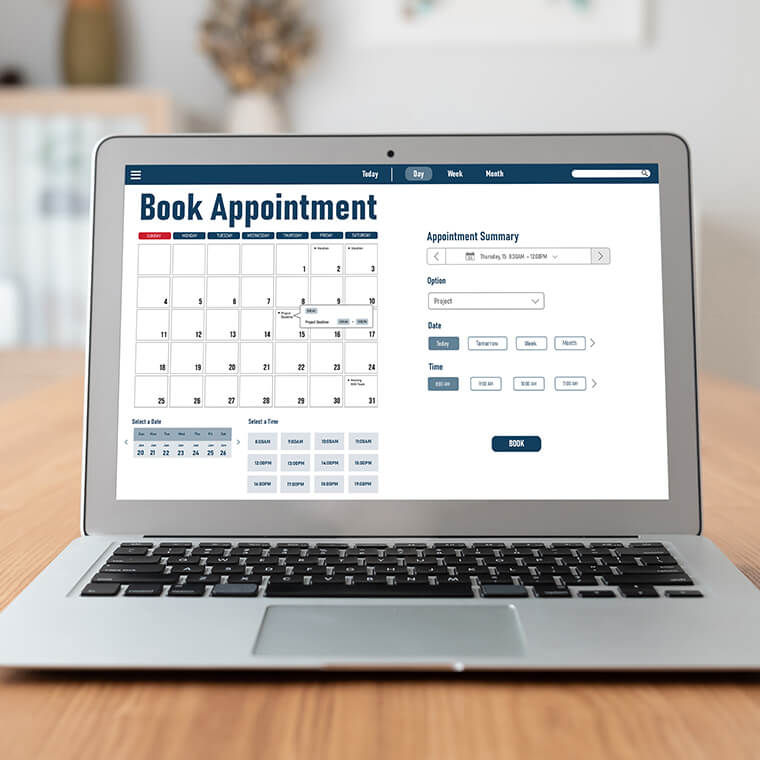
Streamlined appointment scheduling, facilitated by innovative practice management software, revolutionizes the patient experience by offering online booking portals with real-time availability updates and automated appointment reminders. Patients can conveniently schedule their appointments online, selecting from available time slots without the hassle of phone calls or confusion over scheduling. This transparent and efficient process also reduces no-show rates and optimizes chair utilization, ultimately enhancing practice efficiency.
It's also important to understand that your scheduling system directly impacts your marketing efforts. Research underscores the importance of modern booking processes; 72% of Millennials and GenZ patients prefer dental providers that offer online scheduling features. This functionality also benefits wait times in your lobby since this streamlined process minimizes disruptions and ensures a smoother, more efficient check-in-to-checkout experience.
4. Integration with Marketing Tools
Seamless integration between practice management software and marketing tools has revolutionized dental practice marketing. With this integration, tasks like email marketing and social media management become effortless, allowing practices to execute targeted campaigns with ease because access to these communication channels has been centralized under a single platform.
For instance, integrated email marketing enables personalized communication by syncing patient data, while social media management tools streamline content scheduling and performance tracking. With integrated reputation management features like Pozative Reviews, your dental practice can proactively enhance online engagement and attract new patients.
5. Improved Workflow Efficiency
Modern dental software revolutionizes administrative processes within dental practices, automating tasks like patient intake, billing, and insurance processing. By centralizing patient information and automating repetitive tasks, such software enhances operational efficiency, freeing up staff time for marketing initiatives and patient care.
For instance, Adit Dental Software automates the intake process using digital Patient Forms, pre-verifies insurance verification and uses real-time appointment scheduling. These features reduce paperwork errors and streamline administrative tasks, allowing your dental team to focus on strategic marketing efforts and deliver exceptional patient experiences that drive practice growth and enhance overall performance. Imagine being able to reclaim up to 15 hours of lost production time a week, saving you nearly $12k a year on average!
6. Compliance and Security
Protecting patient data and ensuring regulatory compliance are top priorities for dental practices. Practice management software offers robust security features and compliance tools to safeguard sensitive information and maintain HIPAA compliance. With encrypted data storage, user authentication controls, and audit trails, practices can mitigate security risks and protect patient privacy.
According to research by the Ponemon Institute, healthcare organizations that experience a data breach incur an average cost of $2.1 million, underscoring the importance of investing in secure practice management solutions.
7. Call Tracking
Call tracking is a vital component of effective dental practice marketing, providing invaluable insights into the performance of various marketing channels. Integrated into practice management software, call tracking allows practices to monitor incoming calls, track conversion rates, and analyze caller demographics.
For example, a dental practice running Google Ads campaigns can attribute incoming calls to specific ads, enabling them to measure the effectiveness of their campaigns in generating leads. With call tracking, your dental office can gain actionable data to make informed decisions and optimize its marketing strategies. You could adjust staffing levels or marketing tactics based on peak call times and focus on channels that yield the highest conversion rates. This capability empowers you to maximize your ROI and achieve your marketing goals.
8. Centralized Communication using VoIP

Centralizing communication channels using Voice over Internet Protocol (VoIP) technology is a transformative approach for dental practices, enhancing operational efficiency and patient interactions. With Adit Voice, dental providers streamline their communication processes, through smart routing call management, transcribed voicemails, and sending text messages from a centralized platform on any web-connected device. This ensures prompt responses to patient inquiries and minimizes wait times, ultimately improving the overall patient experience.
Adit's VoIP integration goes beyond basic call management, offering advanced features like call recording and analytics. This gives invaluable insight into call performance, patient interactions, and how to customize call routing options.
9. Mobile Apps
In today's digital age, mobile apps are transforming the patient experience in dental practices. Offering a dedicated mobile app allows patients to easily schedule appointments, access medical records, and receive appointment reminders directly from their smartphones or tablets. Beyond simplifying administrative tasks, mobile apps foster seamless communication between patients and providers, enabling inquiries, prescription requests, and even remote consultations.
Imagine you have a patient who is a busy professional with a hectic schedule, in need of a dental check-up but is struggling to find time to make a phone call during work hours. One of your Facebook ads offering last-minute dental exam appointments pops up and this moment highlights the marketing power of a convenient mobile app. With just a few taps on a smartphone, patients can effortlessly book appointments, access their accounts, and make changes to their visits.
10. Cloud-Based Flexibility for Scalability and Growth
Imagine this scenario: Your practice experiences a surge in patient demand, prompting the need to add new providers or increase appointment capacity. With traditional on-premises systems, such growth spurts often entail costly hardware upgrades, complex installations, and lengthy downtime—all of which can impede your practice's momentum. However, with cloud-based practice management software, the story unfolds differently.
With marketing comes growth, and your PMS should be flexible enough to scale with you. Cloud-hosted dental software like Adit offers advanced flexibility for growing dental practices to easily expand their technological resources as their patient base and operational needs blossom. Whether opening new locations, adding providers, or increasing patient volume, cloud-based practice management software ensures that practices can adapt and grow without the constraints of traditional on-premises systems.
Should You Collaborate with a Digital Marketing Agency?

When it comes to digital marketing, many dental practices find themselves at a crossroads: Should they handle marketing efforts in-house or collaborate with a digital marketing agency? While some practices may opt for the DIY approach thinking they will save costs, partnering with a professional agency offers a long list of benefits that can outweigh its initial investment.
- Masterminds of Marketing: Think of digital marketing agencies as the Avengers of the marketing world, but instead of saving the universe, they're here to save your practice from obscurity. These folks eat, sleep, and breathe marketing strategies, armed with the latest tools and techniques to propel your practice to new heights.
- Time is Money: Running a dental practice is a full-time gig, leaving little time to master the intricacies of digital marketing. Enter the dental marketing experts of Adit, swooping in to streamline your day-to-day ops and free up your precious time. With their expertise at your disposal, you can focus on what you do best—transforming smiles.
- Access to Cutting-Edge Tech: Ever feel like you're stuck in the Stone Age while your competitors zip ahead with high-tech marketing tools? Marketers come equipped with a toolbox full of state-of-the-art technology, from analytics to ad campaigns, they ensure your practice stays ahead of the competition.
- Flexibility for Growth: As your practice expands, so do your marketing needs. A seasoned marketing firm has the flexibility to scale your efforts seamlessly, whether you're aiming for local domination or a national multi-branch conquest. With their adaptable strategies, you can conquer new markets and attract a legion of loyal patients.
- Affordable Awesomeness: Let's talk turkey—DIY marketing mistakes can cost you a pretty penny. From misguided ad spend to missed opportunities, the price of going it alone can be steep. On the flip side, partnering with a digital marketing agency is often more affordable than you think, offering a high return on investment and peace of mind.
So, should you partner with a digital marketing agency? The answer is a resounding YES! Don't let marketing anxiety or previous failures hold you back. Help your practice achieve your goals and soar to new heights.
Ready to Unleash Your Practice's Potential? Adit Is Here

With over a decade of experience working closely with dentists and their teams, we understand the challenges and frustrations of dental marketing. That's why we're committed to delivering tangible results, month after month. Our innovative team leverages cutting-edge technology to track and quantify all marketing efforts, providing you with full transparency and accountability. You'll have access to the latest keyword data, call tracking, and web traffic metrics, allowing you to pinpoint how and where new patients find you.
Here's how we do it:
- Comprehensive Analytics: Use Practice Analytics to gather data on every aspect of your marketing campaigns, from website visits and click-through rates to treatment trends and patient compliance. Drill down into the finer details of your operations to create effective advertising strategies that convert and retain patients.
- Keyword Research: Adit's expert dental marketers conduct in-depth keyword research to identify the most relevant and high-converting keywords for your practice, ensuring maximum visibility and engagement in search engine results.
- Call Tracking Integration: With our call tracking technology, your dental team can monitor incoming calls generated by your ad campaigns, providing valuable insights into the effectiveness of different campaigns and channels.
- Patient Recall Integration: Adit Patient Recall is a crucial piece of your marketing puzzle. With it, your team can automate appointment reminders, recall campaigns, and follow-up communications, improving patient retention and keeping your schedule full.
- Email Marketing Integration: Our email features enable your practice to design and deliver targeted email campaigns, automate follow-up sequences, and track engagement metrics to nurture leads and drive conversions.
- Social Media Ads Integration: We integrate with social media advertising platforms such as Instagram and Facebook Ads to create and optimize targeted ad campaigns, track performance metrics, and adjust targeting strategies in real-time, maximizing your practice's reach and engagement on social media.
- Patient Texting Integration: Our patient texting solutions seamlessly integrate with popular PMS solutions to enable two-way communication with patients via text message, streamlining appointment scheduling, reminders, and follow-up, and enhancing patient satisfaction.
- Website Development: Our team of experienced web developers specializes in creating custom websites optimized for dental practices, incorporating user-friendly design, mobile responsiveness, and search engine optimization (SEO) best practices to attract and convert prospective patients.
- Adit Voice Integration: With Adit Voice, our centralized VoIP solution, we streamline communication across all channels, including phone calls, text messages, and emails, providing seamless integration with your practice management software and improving efficiency and effectiveness in patient communication and engagement.
- Dental PPC: Run Google Ads to get your brand recognized by patients in your area, maximizing your practice's visibility and attracting high-intent leads.
- Dental SEO: Get found on Google by ranking at the top of search results both on Maps and organically, increasing your practice's visibility and attracting more traffic with smart SEO.
- Dental Office Training: We train your team to improve how they handle incoming phone calls and encourage patients to review, enhancing patient satisfaction and retention.
- Reputation Management: Your reputation is everything. That’s why we make sure your reputation online is consistent and positive with Pozative, managing and monitoring your online presence to safeguard your practice's reputation and credibility.
- Practice Health Score: Know where your practice stands in the dental industry. Your customized practice health score gives your team specific data around core practice functions and instant recommendations to make improvements.
With our comprehensive suite of marketing solutions and integrated technologies, combined with our unwavering commitment to your success, you can trust that your dental marketing efforts are in capable hands. Let us help you unlock the full potential of your practice and achieve your growth goals with confidence.
more about Adit?
Say goodbye to the hassle of using multiple tools. Adit centralizes your calls, texts, payments, reviews, and scheduling into one powerful dashboard. Simplify your operations and boost patient satisfaction today.
Schedule a DemoAngela is a former English teacher turned marketing content specialist. Over the past 10 years, she’s developed marketing strategies to forge enduring bonds between B2B, B2C and SaaS companies and their clients through holistic education, effective communication, and captivating storytelling that moves audiences to act.
Get a $25 Gift Card when you take a demo
Schedule a DemoGet a $50 Gift Card
when you take a demo
Looks like you're out of bounds!
Hey there! Your current location falls outside Adit's area of operation. If this is unexpected, try disabling your VPN and refresh your page. For further assistance or to book a live demo, connect with us at 832-225-8865.
February 22 Amazon Demo Promo
Terms and Conditions
Last Updated: February 22, 2026Offer ends February 25, 2026, and is limited to prospective customers who sign an annual agreement before February 28, 2026. Gift card will be emailed to the company owner or established representative within 4 weeks of signing the annual agreement. Offer may not be combined with any other offers and is limited to one (1) gift card per office. Offer is not available to current customers or to prospective customers or individuals that have participated in a Adit demo during the prior six (6) months. Recipient is responsible for all taxes and fees associated with receipt and/or use of the gift card as well as reporting the receipt of the gift card as required under applicable federal and state laws. Adit is not responsible for and will not replace the gift card if it is lost or damaged, is not used within any applicable timeframe, or is misused by the recipient. Adit is not responsible for any injury or damage to persons or property which may be caused, directly or indirectly, in whole or in part, from the recipient’s participation in the promotion or receipt or use of the gift card. Recipient agrees to indemnify, defend and hold harmless Adit from and against any and all claims, expenses, and liabilities (including reasonable attorney’s fees) arising out of or relating to a recipient’s participation in the promotion and/or recipient’s acceptance, use or misuse of the gift card. This offer is sponsored by Adit Communications, Inc. and is in no way sponsored, endorsed or administered by, or associated with Amazon.
Thank You!
We appreciate your interest! Adit AI will be calling you in the next few minutes!
Why Adit?
Cut your software bill by up to 60% when you merge everything your dental office needs to run under one roof.
Centralize Communications
- Phones & TeleMed
- Emails & eFax
- Texting & Reminders
- Call Tracking and more!
Streamline Operations
- Patient Forms
- Online Scheduling
- Payments
- Reviews and more!
Boost Production
- Performance Dashboards
- Morning Huddle
- Claims & Collections
- Patient Profiles
- Follow Up Lists
- Year Over Year Metrics
Acquire More Patients
- Digital Marketing
- Website Design
- SEO
- Google Ads
- Facebook Ads
when you sign up with Adit!
Sign up by filling out the form


